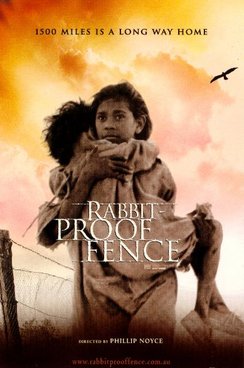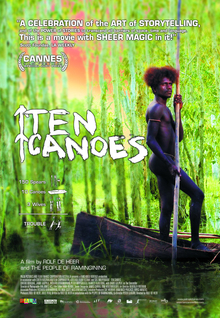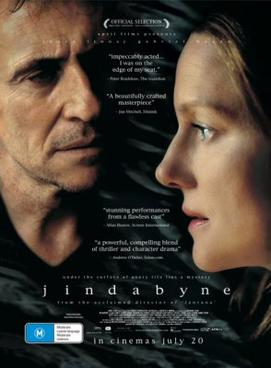
Peter Lindsay Weir is an Australian retired film director. He is known for directing films crossing various genres over forty years with films such as Picnic at Hanging Rock (1975), Gallipoli (1981), The Year of Living Dangerously (1982), Witness (1985), Dead Poets Society (1989), Fearless (1993), The Truman Show (1998), Master and Commander: The Far Side of the World (2003), and The Way Back (2010). He has received six Academy Award nominations, ultimately being awarded the Academy Honorary Award in 2022 for his lifetime achievement career.

Rabbit-Proof Fence is a 2002 Australian drama film directed and produced by Phillip Noyce based on the 1996 book Follow the Rabbit-Proof Fence by Doris Pilkington Garimara. It is loosely based on a true story concerning the author's mother Molly Craig, aunt Daisy Kadibil and cousin Gracie, who escaped from the Moore River Native Settlement, north of Perth, Western Australia, to return to their Aboriginal families, after being placed there in 1931. The film follows the Aboriginal girls as they walk for nine weeks along 1,500 miles (2,400 km) of the Australian rabbit-proof fence to return to their community at Jigalong, while being pursued by white law enforcement authorities and an Aboriginal tracker. The film illustrates the official child removal policy that existed in Australia between approximately 1905 and 1967. Its victims now are called the "Stolen Generations".

Jedda, released in the UK as Jedda the Uncivilised, is a 1955 Australian film written, produced and directed by Charles Chauvel. His last film, it is notable for being the first to star two Aboriginal actors, Robert Tudawali and Ngarla Kunoth in the leading roles. It was also the first Australian feature film to be shot in colour.

Gary Edward Foley is an Aboriginal Australian activist of the Gumbaynggirr people, academic, writer and actor. He is best known for his role in establishing the Aboriginal Tent Embassy in Canberra in 1972 and for establishing an Aboriginal Legal Service in Redfern in the 1970s. He also co-wrote and acted in the first Indigenous Australian stage production, Basically Black.

Richard Joseph Frankland is an Australian playwright, scriptwriter and musician. He is an Aboriginal Australian of Gunditjmara origin from Victoria. He has worked significantly for the Aboriginal Australian cause.

Ten Canoes is a 2006 Australian historical drama/docudrama film directed by Rolf de Heer and Peter Djigirr and starring Crusoe Kurddal. The film is set in Arnhem Land in northern Australia, before Western influence, and tells the story of a group of ten men doing traditional hunting in canoes. A narrator tells the story, and the overall format is that of a moral tale.

Jindabyne is a 2006 Australian drama film by third time feature director Ray Lawrence and starring Gabriel Byrne, Laura Linney, Deborra-Lee Furness and John Howard. Jindabyne was filmed entirely on location in and around the Australian country town of the same name: Jindabyne, New South Wales, situated next to the Snowy Mountains.
Blackfella is an informal term in Australian English to refer to Indigenous Australians, in particular Aboriginal Australians, most commonly among themselves.
The Djarn Djarns is a 2005 Australian short film, written and directed by Wayne Blair.
Brian Gregory Syron was an actor, teacher, Aboriginal rights activist, stage director and Australia's first Indigenous feature film director, who has also been recognised as the first First Nations feature film director. After studying in New York City under Stella Adler, he returned to Australia and was a co-founder of the Australian National Playwrights Conference, the Eora Centre, the National Black Playwrights Conference, and the Aboriginal National Theatre Trust. He worked on several television productions and was appointed head of the ABC's new Aboriginal unit in 1988.

Radiance is a 1998 Australian independent film. It is the first feature film by Aboriginal director Rachel Perkins about three indigenous sisters who reunite for their mother's funeral. The film is based on the 1993 play written by Louis Nowra.

Robert Lewis Maza, known as Bob Maza, was an Aboriginal Australian actor, playwright and activist.

Maroochy Barambah is an Australian Aboriginal mezzo-soprano singer. She is a song-woman, law-woman and elder of the Turrbal people.
Harry's War is an Australian short film. It is written and directed by Richard Frankland produced by John Foss and Richard Franklin and stars David Ngoombujarra. It was broadcast nationally on SBS and ABC TV.
No Way to Forget is an Australian short film. It is written and directed by Richard Frankland, produced by John Foss and stars David Ngoombujarra in the lead role as SHANE FRANCIS. It is the first film by an indigenous director to win an AFI Award. It was broadcast nationally on SBS TV. It screened at the 1996 Cannes Film Festival in the category of Un Certain Regard.
Dead Heart is a 1996 Australian film. It was written and directed by Nick Parsons, and starred Bryan Brown, Angie Milliken, Ernie Dingo, Aaron Pedersen and John Jarratt. As a play, the piece was staged by Belvoir St Theatre, directed by Neil Armfield, at the Eveleigh rail yards, Sydney, in 1994. In 1993, the play received the NSW Premier's Literary Award for a play.
Cecil William Holmes was a New Zealand-born film director and writer.

Manganinnie is an AFI Award-winning 1980 film which follows the journey of Manganinnie, a Tasmanian Aboriginal woman who searches for her tribe with the company of a lost white girl named Joanna. Based on Beth Roberts' novel of the same name, it was directed by John Honey and was the first feature film to be financed by the short-lived Tasmanian Film Corporation.
I, the Aboriginal is an Australian book and television film about the life of Aboriginal Australian Phillip Roberts.










